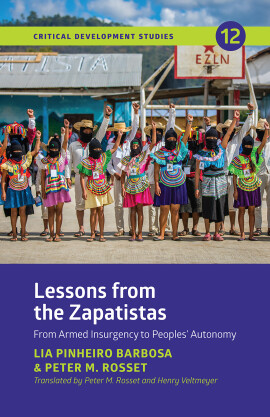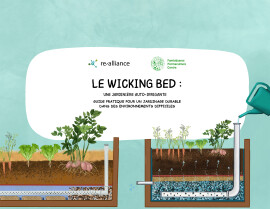
African Perspectives on Agroecology
Why farmer-led seed and knowledge systems matter
Seed embodies life, power, and culture. From Africa’s deserts and drylands to its mighty river systems and tropical forests, from those growing a multiplicity of grains, legumes, and vegetables, to others struggling to produce enough to feed their families, seed provides the mainstay for the continent’s 500 million small-scale farmers and is at the heart of rich and varied cultures.
But seed is under siege. With the world’s food and agricultural systems increasingly industrialized, homogenized, and privatized, seed epitomizes the struggles involved is symbolic of the deep injustices that have emerged.
These include everything from the policies that benefit commercial farmers and seed and agro-chemical companies – at severe cost to the environment, climate, and small-scale farmers – to the new wave of philanthropy, promoting Green Revolution approaches of genetic modification and quick-fix nutritionism as a remedy for the poor, despite their failure elsewhere in the world.
Africa’s seemingly ‘unproductive’ lands are now viewed as the last frontier for agribusiness. Yet there is little documented about the resilience of local seed systems, and the innovative approaches adopted by small-scale farmers to retain agrobiodiversity, and to pursue agroecological approaches to farming that not only produce sufficient food but also eliminate harmful inputs.
Western, scientific, and traditional knowledges are beginning to mingle in transformative ways, and inspiring pioneers in the formal structures of government and research institutions are demonstrating that another way is possible. Social movements, long silent in Africa, are emerging as a powerful force for change, alongside the NGOs who provide support to farmers at different levels.
Uniquely, this book offers a contribution that is enriched by the collaborative, creative, and critical voices of African farmers, activists, scientists, scholars, and policymakers. Their viewpoints combine in this volume to articulate a shared and dynamic vision of a world where agriculture is productive, diverse, and sustainable; where different ways of seeing and knowing are respected; and where seed and food systems are in the hands of farmers and local communities.
Published: 2024
Pages: 398
eBook: 9781780447445
Paperback: 9781788530224
Hardback: 9781788530217
But seed is under siege. With the world’s food and agricultural systems increasingly industrialized, homogenized, and privatized, seed epitomizes the struggles involved is symbolic of the deep injustices that have emerged.
These include everything from the policies that benefit commercial farmers and seed and agro-chemical companies – at severe cost to the environment, climate, and small-scale farmers – to the new wave of philanthropy, promoting Green Revolution approaches of genetic modification and quick-fix nutritionism as a remedy for the poor, despite their failure elsewhere in the world.
Africa’s seemingly ‘unproductive’ lands are now viewed as the last frontier for agribusiness. Yet there is little documented about the resilience of local seed systems, and the innovative approaches adopted by small-scale farmers to retain agrobiodiversity, and to pursue agroecological approaches to farming that not only produce sufficient food but also eliminate harmful inputs.
Western, scientific, and traditional knowledges are beginning to mingle in transformative ways, and inspiring pioneers in the formal structures of government and research institutions are demonstrating that another way is possible. Social movements, long silent in Africa, are emerging as a powerful force for change, alongside the NGOs who provide support to farmers at different levels.
Uniquely, this book offers a contribution that is enriched by the collaborative, creative, and critical voices of African farmers, activists, scientists, scholars, and policymakers. Their viewpoints combine in this volume to articulate a shared and dynamic vision of a world where agriculture is productive, diverse, and sustainable; where different ways of seeing and knowing are respected; and where seed and food systems are in the hands of farmers and local communities.
| Foreword - Michael Fakhri | |||
|---|---|---|---|
| Preface | |||
| Introduction | |||
| Part 1: Seed, resilience, and diversity | |||
| 1. Reviving seed and knowledge towards more resilient communities: the power of transformative learning - Elfrieda Pschorn-Strauss | |||
| 2. In the wake of Cyclone Idai: a holistic look at its impacts and an exploration of the resilience-enhancing potential of landscape agroecology - Witness Kozanayi and Jaci van Niekerk | |||
| 3. Enacting indigenous and green revolutions in maize in West Kenya - Paul Hebinck and Richard Dimba Kiaka | |||
| 4. Seed matters: understanding smallholder seed sourcing in Malawi - Noelle LaDue, Sidney Madsen, Rachel Bezner Kerr, Esther Lupafya, Laifolo Dakishoni, and Lizzie Shumba | |||
| 5. Seed sovereignty, knowledge politics, and climate change in northern Ghana - Hanson Nyantakyi-Frimpong and Audrey Carlson | |||
| 6. Seedscapes of contamination: exploring the impacts of transgene flow for South African smallholder farmers - Rachel Wynberg and Angelika Hilbeck | |||
| Part 2: Privatising profit, socialising cost | |||
| 7. Corporate expansion in African seed systems: implications for agricultural biodiversity and food sovereignty - Stephen Greenberg | |||
| 8. Corporate capture of agricultural and food policy in South Africa - David Fig | |||
| 9. The slow and structural violence of agrochemicals: use, management, and regulation in South Africa - Morgan Lee | |||
| Part 3: Ways of seeing and knowing | |||
| 10. ‘Wild wayward free gifts’: A gendered view on agroecology and agricultural transitions - Vanessa Farr | |||
| 11. Unsettling modernist scientific ontologies in the regulation of genetically modified crops in South Africa - Jen Whittingham, Maya Marshak, Haidee Swanby | |||
| Part 4: Transitioning towards agroecology: working together and moving forward the struggle | |||
| 12. Cuba’s participatory seed system: insights for South Africa - Mvuselelo Ngcoya | |||
| 13. We are what we eat: nurture nature - Kristof J. Nordin | |||
| 14. A movement for life: African food sovereignty - Haidee Swanby | |||
| Conclusion: towards seed and knowledge justice for agroecology |
'Wynberg's comprehensively curated volume offers a rich and stimulating selection of perspectives on the challenges to be overcome and the opportunities to be embraced if Africans are to feed themselves justly and sustainably. These essays are especially valuable for the insights they provide on how sovereignty over the use and control of seeds will shape the struggle over a hoped-for transition to an agroecological agriculture for Africa.'
Jack Kloppenburg, Professor Emeritus, University of Wisconsin-Madison, USA; and author of First the Seed: The Political Economy of Plant Biotechnology
'Despite minimal state and donor support, the ‘silent revolution’ of agroecological practices is taking root across Africa. Farmers, NGOs, and research teams are innovating and organizing to fight climate change, inequality, and hunger. This fine collection includes contributions from the frontlines, assembling an array of reflections on the possibilities and constraints facing the wider adoption of agroecology. This terrific anthology is a rejoinder to Afropessimism, and an inspiring call to action.'
Raj Patel, Research Professor, University of Texas, USA; and author of Stuffed and Starved
'Rachel Wynberg’s very useful, and well written, book is packed with relevant overviews, analyses, vignettes of lived experiences and more. It’s an upbeat tour de force, providing thoughtful historical perspectives and current realities about overcoming barriers and building on local knowledge and the growing seed and food sovereignty movements in the continent. She weaves all these together in her brilliant opening and closing chapters. These demonstrate the imperative of having smallholder farmer seed systems at the heart of viable agroecological, food systems that are biodiverse, nutritious and environmentally sustainable, and need to be scaled-out across all of Africa. This well referenced book is a joy to read.'
Patrick Mulvany, Food Ethics Council, UK
'African Perspectives on Agroecology brings together a vast range of experience from diverse communities and countries in Africa. The contributing authors illustrate the complexities and unique contexts in which agroecological transitions based on local seed biodiversity and indigenous knowledge are occurring. These are stories of hope and resistance for freedom and the renewal of life. As such, this is an inspiring book – a ‘must read’ for all who care about the future of Africa and its people.'
Michel Pimbert, Professor at the Centre for Agroecology, Water and Resilience, Coventry University, UK
'African Perspectives on Agroecology narrates the story on how a coalition of farmers, NGOs and academics engage in a process of restoration of traditional seed and knowledge as the pillars for re-creating a biodiverse, resilient and socially just agriculture capable of fulfilling food, water and seed sovereignty and adaptation to climate change in a planet in polycrisis.'
Miguel A Altieri, Professor Emeritus of Agroecology, University of California, Berkeley
'An agroecological transformation of our food systems is urgently needed. This timely book takes the reader through the steps that are already being taken to achieve this, highlighting the importance of farmer-led seed and knowledge systems that are often overlooked. This book is an essential companion for anyone working to transform food system in Africa.'
Emile Frison, Senior Advisor, Agroecology Coalition and Former Director General of Bioversity International
'A response to the biodiversity crisis… African Perspectives on Agroecology: Why Farmer-led Seed and Knowledge Systems Matter reminds us of the need to deepen the seed and knowledge work with farmers to revive, enhance and create pockets of resilience for hope and learning.'
Gertrude Pswarayi-Jabson, Country Coordinator, Participatory Ecological Land Use Management (PELUM) Zimbabwe
'This book is a must for all stakeholders engaged in improving seed and food security in Africa. It provides central building blocks for the transition required to boost farmers’ own seed and agricultural systems across Africa and shows with compelling clarity that such an approach is vital for achieving sustained seed and food security on the continent.'
Regine Andersen, Research Director, Fridtjof Nansen Institute, Norway and author of Governing Agrobiodiversity: plant genetics and developing countries
‘African Perspectives on Agroecology: Why Farmer-led Seed and Knowledge Systems Matter’ shines a spotlight on the agroecological transition pathway, and the importance of farmers’ access to genetic resources for sustainable food systems in Africa and beyond. This book is a holistic exploration of the seed biodiversity crises created by the corporate capture of seed systems in Africa.’
Mamadou Goïta, Executive Director, Institute for Research and Promotion of Alternatives in Development
Decolonizing technology assessment: Towards a radical transformation of the modern world
Arora, Saurabh
Van Dyck, Barbara
TATuP - Zeitschrift für Technikfolgenabschätzung in Theorie und Praxis, Vol. 34 (2025), Iss. 1 P.15
https://doi.org/10.14512/tatup.7166 [Citations: 0]Rachel Wynberg (Ed.): African perspectives on agroecology: Why farmer-led seed and knowledge systems matter
Ojo, Emmanuel Ohimai
Agriculture and Human Values, Vol. 42 (2025), Iss. 4 P.3185
https://doi.org/10.1007/s10460-025-10767-4 [Citations: 0]The Adoption and Scaling of Climate-Smart Agriculture Innovation by Smallholder Farmers in South Africa: A Review of Institutional Mechanisms, Policy Frameworks and Market Dynamics
Olabanji, Mary Funke
Chitakira, Munyaradzi
World, Vol. 6 (2025), Iss. 2 P.51
https://doi.org/10.3390/world6020051 [Citations: 8]How Africa Eats: Trade, Food Security and Climate Risks
Policy, resources, actors and capacities
Ancharaz, Vinaye Dey
2025
https://doi.org/10.31389/lsepress.hae.d [Citations: 0]





